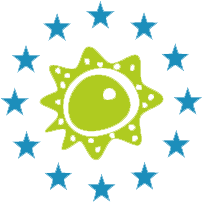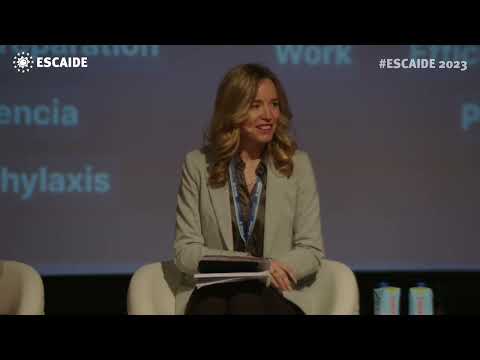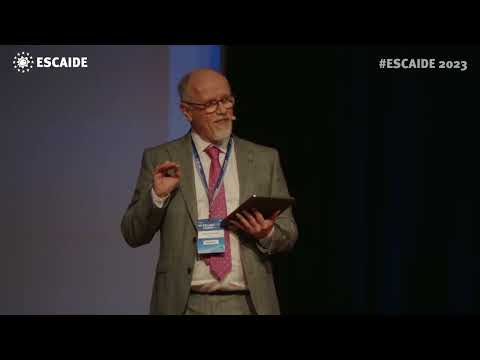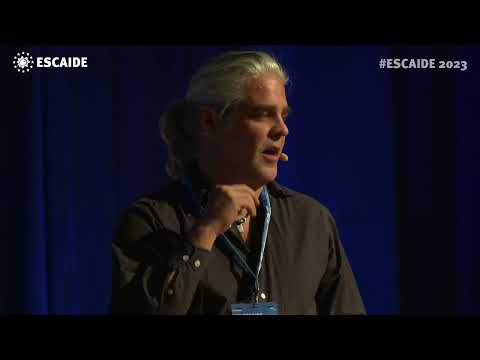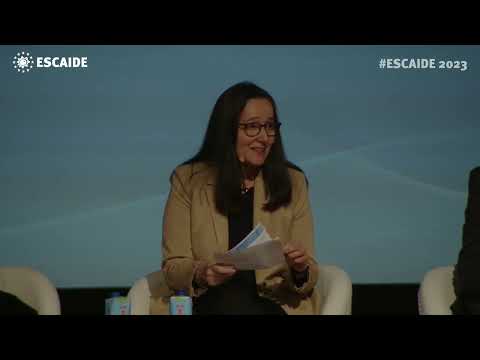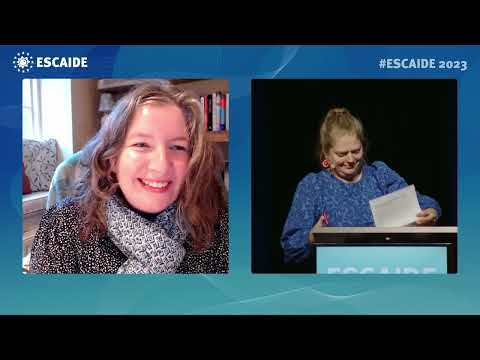Plenaries at ESCAIDE 2023
Plenaries provide an opportunity to discuss public health challenges and scientific advances, bring together experts in cross-cutting fields to enable evidence from infectious disease research and epidemiology to be translated into improvements in public health.
The content of plenaries is developed by the ESCAIDE Scientific Committee (11 cross-field members), who invite high-level speakers to deliver inspiring presentations and address questions from the audience. There were five plenary sessions at ESCAIDE 2023, chaired by the ESCAIDE Scientific Committee. The format of each varies from panel discussions, interviews and debates. The topics included digital transformation and artificial intelligence, revisiting the concept of 'prevention' for communicable diseases, wastewater surveillance, One Health and the post-pandemic public health workforce.
Plenaries in hybrid: All plenary sessions were live-streamed to the conference platform, with speakers and audience in the venue and online. Recordings of the sessions are now available on YouTube.
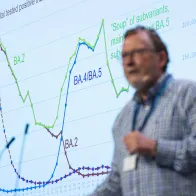
Learn more about the plenary speakers at this year's conference
Plenary A: Broadening the horizon: Revisiting the concept of ‘prevention’ for communicable diseases
Day 1 - Wednesday 22 November, 9:15-10:45
This session aims to reflect on the scope of the concept of ‘prevention’ and its complexities, as well as how it relates to preparedness. The audience will hear from a diverse panel of experts about the challenges, potentials and lessons learned from different disease areas – including non-communicable diseases – and the application and relevance of social and behavioural sciences in communicable disease prevention. The session will also explore the role of Public Health professionals in defining and addressing diverse prevention needs in different population groups, as well as the role of community engagement in communicable disease prevention.
Chairs: Petronille Bogaert (European Commission) and John Kinsman (ECDC)
Speakers: Kateřina Šédová (Loono, Czech Republic), Emilie Karafillakis (University of Antwerp, Belgium), Hanna Tolonen (THL, Finland)
Plenary B: Digital transformation and Artificial Intelligence
Day 1 - Wednesday 22 November, 17:00-18:15
Keynote session
The rise in popularity of Artificial Intelligence presents many opportunities and challenges for communicable disease surveillance and preparedness. In this session the audience will hear about the risks and benefits of digital health technologies, and what this digital transformation entails for the Public Health workforce and their work in accessing scientific information, assessing situations and making decisions.
Chairs: Chikwe Ihekweazu (WHO) and Mike Catchpole (ECDC)
Keynote speaker: John Brownstein (Harvard Medical School, Boston Children's Hospital, USA), Joanna Goodey (European Union Agency for Fundamental Rights)
Plenary C: Wastewater surveillance: a magic bullet or just one piece of the puzzle?
Day 2 - Thursday 23 November, 9:00-10:30
Wastewater surveillance is a promising approach to gathering information about the health of a population, and has gained attention during the COVID-19 pandemic as a potential tool for public health decision-making. This session will explore the potential benefits and limitations of wastewater surveillance, along with the lessons learned from recent experiences for different agents and populations. Experts will discuss wastewater surveillance as one piece of the puzzle, its feasibility and its possible contributions to for future surveillance of a broader range of biological markers in different settings.
Chairs: Jacobo Mendioroz (Public Health Agency of Catalonia) and Henriette de Valk (Santé Publique France)
Speakers: Marta Vargha (National Center for Public Health and Pharmacy, Hungary), Marion Koopmans (Erasmus MC Department of Viroscience, the Netherlands), Paul Griffiths (EMCDDA)
Plenary D: One Health: Tackling global health challenges together
Day 2 - Thursday 23 November, 16:45-18:15
One Health collaboration is widely supported and invested in to tackle global health challenges affecting humans, domestic and wild animals, plants and the environment. However, it requires wide-ranging efforts and novel approaches at all levels, from local to global, across sectors and disciplines, involving professionals, policy-makers, communities, agriculture, industry R&D and others. The session aims to review current achievements and possible future directions and priorities of One Health initiatives and actions, with an emphasis on international collaboration and antimicrobial resistance.
Chairs: Mircea Ioan Popa (Carol Davila University of Medicine and Pharmacy, Romania), Carmen Varela Santos (ECDC) and Agnes Hajdu (National Center for Public Health and Pharmacy, Hungary)
Speakers: Greg Martin (Health Protection Surveillance Centre, Ireland), Karen Saylors (Labyrinth Global Health, USA), Stef Bronzwaer (EFSA), Sandra Gallina (European Commission)
Plenary E: Post-pandemic Public Health workforce
Day 3 - Friday 24 November, 9:00-10:30
The COVID-19 pandemic has had a profound impact on the Public Health workforce and their work environment, leaving many professionals overwhelmed and fatigued. How can we address the post-disaster recovery, learn from our experiences and set new priorities to ensure an effective and healthy Public Health workforce? The panel of experts will examine the way forward for Public Health professionals in the post-pandemic reality through a lens of disaster recovery, defining the leadership and skills-mix needed to face the ongoing and future changes. They will discuss how individuals and organisations can address work-life balance and mental wellbeing in rapidly changing environments.
Chairs: Stine Nielsen (EPIET Alumni Network) and Adam Roth (ECDC)
Speakers: Lucy Easthope (Durham University, UK), Katarzyna Czabanowska (Maastricht University, the Netherlands), Giorgio Grossi (Karolinska Insitutet, Sweden)
